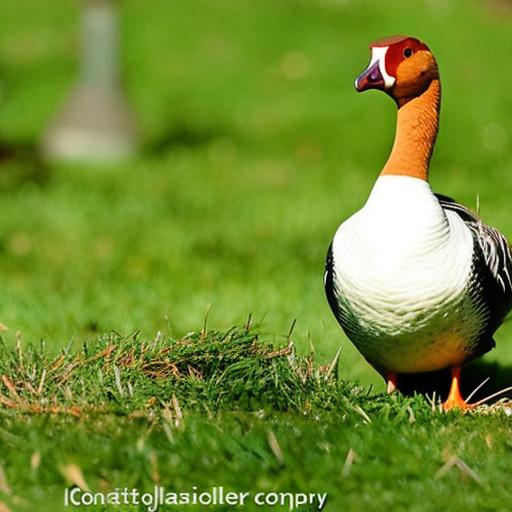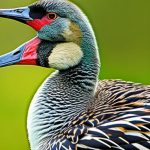Geese are beautiful creatures that are often admired for their graceful flight and elegant appearance. However, when it comes to your lawn, geese can become a nuisance and cause damage to your property. Not only can they leave behind unsightly droppings, but they can also damage your lawn and garden. Additionally, geese can pose health risks as their droppings can contain harmful bacteria. Therefore, it is important to understand the behavior of geese and implement strategies to keep them out of your lawn.
Key Takeaways
- Geese can cause significant damage to your lawn and property.
- Understanding geese behavior can help you identify signs of infestation.
- Natural deterrents like landscaping and decoys can help keep geese away.
- Physical barriers like fences and netting can also be effective.
- Seeking professional help may be necessary for severe infestations.
Understanding the Behavior of Geese: Why They Love Your Lawn
Geese are attracted to open spaces with easy access to water and food. Lawns provide a perfect habitat for geese to graze and rest. They are herbivores and feed on grass, which is abundant in lawns. Moreover, lawns often have ponds or lakes nearby, which provide geese with a source of water. The combination of ample food and water makes lawns an ideal location for geese to settle.
The Damage Geese Can Cause to Your Lawn and Property
Geese can cause significant damage to your lawn and property. One of the most noticeable issues is the accumulation of droppings. Geese have a high metabolism, which means they produce a large amount of waste. Their droppings are not only unsightly but can also damage your lawn by burning the grass and creating bare patches.
In addition to droppings, geese can also damage plants and flowers in your garden. They have a voracious appetite and will eat almost anything green that they come across. This can result in the destruction of your carefully cultivated plants and flowers.
How to Identify Signs of Geese Infestation in Your Lawn
To determine if you have a geese infestation in your lawn, there are several signs you can look for. First, keep an eye out for droppings. Geese droppings are large and can be easily identified. They are usually greenish-brown in color and have a distinct odor.
Another sign of geese infestation is the presence of feathers. Geese molt their feathers regularly, so finding feathers scattered around your lawn is a clear indication that geese have been visiting.
Lastly, look for footprints. Geese have webbed feet, which leave behind distinctive tracks. These tracks can be seen in muddy areas or on soft ground.
Natural Ways to Deter Geese from Your Lawn
If you want to deter geese from your lawn without causing harm to them, there are several natural methods you can try. One effective strategy is to plant tall grasses and shrubs around your lawn. Geese prefer open spaces where they have a clear line of sight, so creating an environment with tall vegetation will make your lawn less inviting to them.
Another natural deterrent is the use of decoys. Placing decoys of natural predators like coyotes or owls in your lawn can scare away geese. Geese are wary of potential threats, and the presence of these decoys can make them think twice about landing on your property.
Setting Up Physical Barriers to Keep Geese Out of Your Lawn

If natural methods are not effective, you may need to set up physical barriers to keep geese out of your lawn. One option is to install fences or netting around your lawn. This will create a physical barrier that prevents geese from accessing your property.
For ponds or lakes on your property, you can use floating barriers to prevent geese from landing. These barriers are placed on the water’s surface and make it difficult for geese to approach or land.
Using Repellents and Scare Tactics to Keep Geese Away
Repellents and scare tactics can also be effective in deterring geese from your lawn. Noise-making devices like air horns or whistles can startle geese and make them uncomfortable. By creating a loud and unexpected noise, you can discourage geese from settling on your property.
Another option is to apply repellents to your lawn. Grape concentrate or hot pepper spray can be sprayed on the grass to make it unappealing to geese. These substances have a strong odor or taste that geese find unpleasant, which will discourage them from grazing on your lawn.
Seeking Professional Help for Geese Infestation in Your Lawn
If you are dealing with a severe geese infestation or if your efforts to deter them have been unsuccessful, it may be necessary to seek professional help. A wildlife control professional can provide humane removal of geese from your property. They have the expertise and experience to safely relocate the geese without causing harm to them.
Additionally, consulting a lawn care specialist can be beneficial for long-term prevention strategies. They can assess the condition of your lawn and provide recommendations on how to maintain a healthy lawn that is less attractive to geese.
Long-Term Strategies for Preventing Geese from Invading Your Lawn
To prevent geese from invading your lawn in the long term, there are several strategies you can implement. First, it is important to maintain a healthy lawn. Regular mowing and fertilization will keep your grass healthy and dense, making it less appealing to geese.
Aeration is another important practice that can help deter geese. By aerating your lawn, you reduce soil compaction and improve drainage. This makes the soil less attractive to geese as it becomes more difficult for them to find food.
Maintaining a Beautiful Lawn Without Geese Interference
With the right strategies, you can keep geese out of your lawn and maintain a beautiful outdoor space. It is important to remember to be humane and respectful of wildlife while protecting your property. By understanding the behavior of geese and implementing natural deterrents, physical barriers, and repellents, you can create an environment that is uninviting to geese. Additionally, seeking professional help and implementing long-term prevention strategies will ensure that your lawn remains free from geese interference.
If you’re tired of geese invading your lawn and leaving behind a mess, you’ll want to check out this helpful article on how to keep geese out of your yard. One effective solution is to create a barrier using a chicken coop. Not only does it provide a safe and secure space for your chickens, but it can also deter geese from entering your property. To learn more about the benefits of using a chicken coop as a geese deterrent, check out this informative article on Poultry Wizard’s website: https://poultrywizard.com/keeping-chickens/chicken-coop-muskegon/.
FAQs
What are the common reasons for geese to invade lawns?
Geese are attracted to lawns because they provide a source of food, water, and shelter. They also prefer open spaces where they can easily spot predators.
What are the negative effects of geese on lawns?
Geese can cause damage to lawns by eating grass, leaving droppings, and creating nests. Their droppings can also be a health hazard and can make the lawn unsightly.
What are some effective ways to keep geese out of lawns?
Some effective ways to keep geese out of lawns include using physical barriers such as fences or netting, using decoys or scare tactics, and removing food sources such as bird feeders or pet food.
Are there any humane methods to keep geese away from lawns?
Yes, there are humane methods to keep geese away from lawns such as using noise deterrents, planting vegetation that geese do not like, and using motion-activated sprinklers.
Is it legal to harm or kill geese to keep them away from lawns?
No, it is not legal to harm or kill geese to keep them away from lawns. Geese are protected under federal and state laws, and harming or killing them can result in fines and legal consequences.
Meet Walter, the feathered-friend fanatic of Florida! Nestled in the sunshine state, Walter struts through life with his feathered companions, clucking his way to happiness. With a coop that’s fancier than a five-star hotel, he’s the Don Juan of the chicken world. When he’s not teaching his hens to do the cha-cha, you’ll find him in a heated debate with his prized rooster, Sir Clucks-a-Lot. Walter’s poultry passion is no yolk; he’s the sunny-side-up guy you never knew you needed in your flock of friends!







